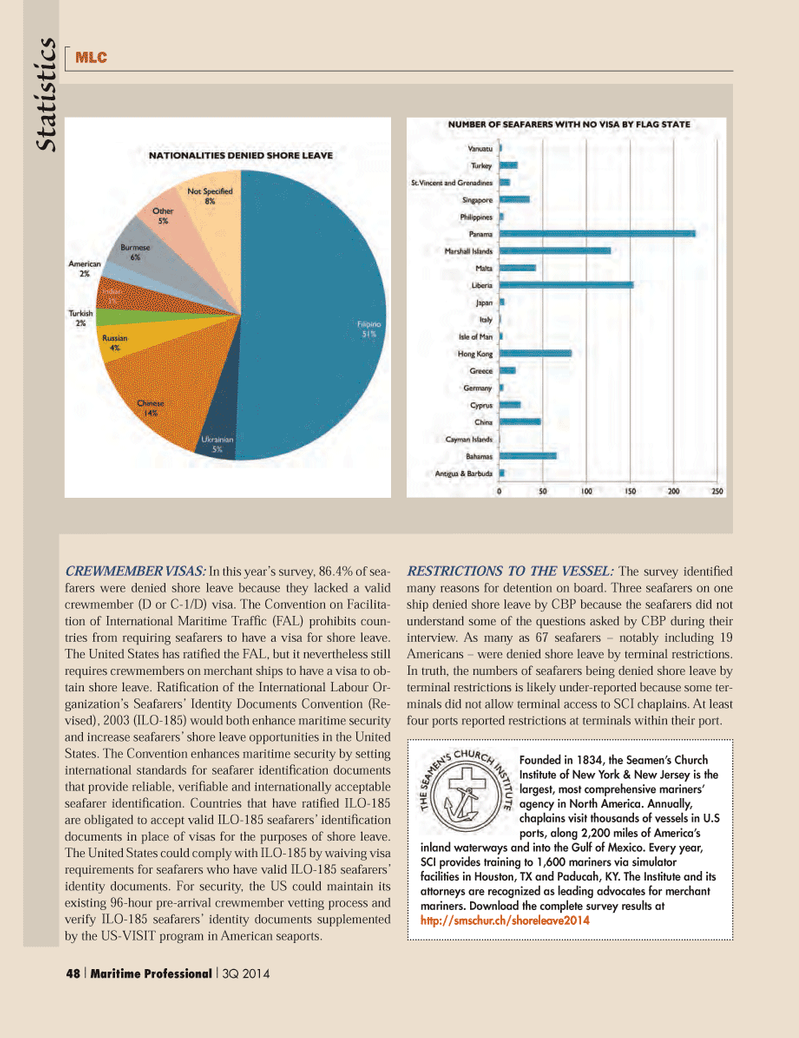
Page 48: of Maritime Logistics Professional Magazine (Q3 2014)
Power & Fuel Management
Read this page in Pdf, Flash or Html5 edition of Q3 2014 Maritime Logistics Professional Magazine
MLC Statistics CREWMEMBER VISAS: In this year?s survey, 86.4% of sea- farers were denied shore leave because they lacked a valid crewmember (D or C-1/D) visa. The Convention on Facilita- tion of International Maritime Traf c (FAL) prohibits coun- tries from requiring seafarers to have a visa for shore leave. The United States has rati ed the FAL, but it nevertheless still requires crewmembers on merchant ships to have a visa to ob- tain shore leave. Rati cation of the International Labour Or- ganization?s Seafarers? Identity Documents Convention (Re- vised), 2003 (ILO-185) would both enhance maritime security and increase seafarers? shore leave opportunities in the United States. The Convention enhances maritime security by setting international standards for seafarer identi cation documents that provide reliable, veri able and internationally acceptable seafarer identi cation. Countries that have rati ed ILO-185 are obligated to accept valid ILO-185 seafarers? identi cation documents in place of visas for the purposes of shore leave. The United States could comply with ILO-185 by waiving visa requirements for seafarers who have valid ILO-185 seafarers? identity documents. For security, the US could maintain its existing 96-hour pre-arrival crewmember vetting process and verify ILO-185 seafarers? identity documents supplemented by the US-VISIT program in American seaports. RESTRICTIONS TO THE VESSEL: The survey identi ed many reasons for detention on board. Three seafarers on one ship denied shore leave by CBP because the seafarers did not understand some of the questions asked by CBP during their interview. As many as 67 seafarers ? notably including 19 Americans ? were denied shore leave by terminal restrictions. In truth, the numbers of seafarers being denied shore leave by terminal restrictions is likely under-reported because some ter- minals did not allow terminal access to SCI chaplains. At least four ports reported restrictions at terminals within their port.Founded in 1834, the Seamen?s Church Institute of New York & New Jersey is the largest, most comprehensive mariners? agency in North America. Annually, chaplains visit thousands of vessels in U.S ports, along 2,200 miles of America?s inland waterways and into the Gulf of Mexico. Every year, SCI provides training to 1,600 mariners via simulator facilities in Houston, TX and Paducah, KY. The Institute and its attorneys are recognized as leading advocates for merchant mariners. Download the complete survey results at http://smschur.ch/shoreleave2014 48 I Maritime Professional I 3Q 201434-49 Q3 MP2014.indd 4834-49 Q3 MP2014.indd 488/13/2014 3:20:01 PM8/13/2014 3:20:01 PM

 47
47

 49
49
